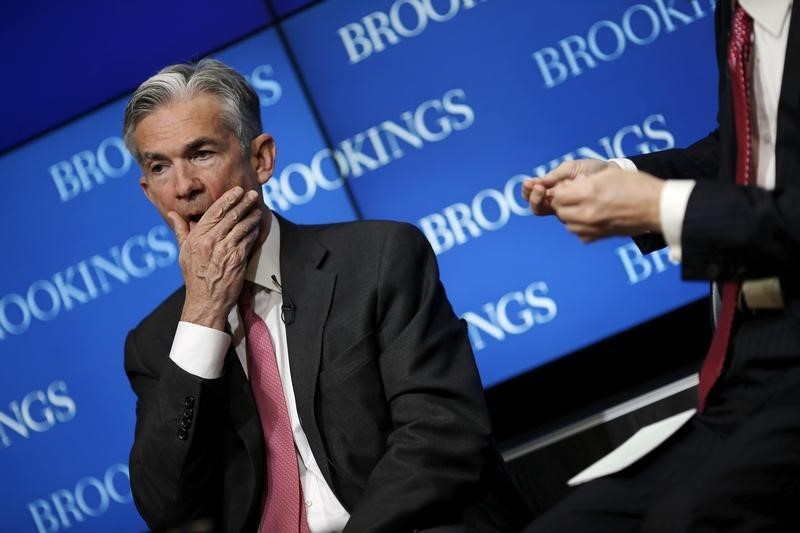Investing.com -- Fed chief Jerome Powell again signals more rate hikes are likely this year, prompting weakness in the equity and energy markets and the focus on the latest round of central bank speakers. Adani Group is back under pressure as U.S. authorities investigate the Indian conglomerate, while the Turkish lira falls to record lows.
1. Powell maintains rate hike view; more Fed speakers due
Jerome Powell finished his two-day semi-annual testimony to Congress on Thursday, and the chairman of the U.S. Federal Reserve stuck to his previously voiced line that more rate hikes are likely this year as the central bank fights inflation back to its 2% target rate.
"We don't want to do more than we have to,” Powell said, in front of the Senate Banking Committee. “Overwhelmingly people on the (Federal Open Market) Committee do think that there's more rate hikes coming but we want to make them at a pace that allows us to see incoming information."
Futures traders see a greater than 75% probability that the next rate hike will come in July, with another quarter of a percentage point increase later this year.
The Fed has made it clear that it is closely watching economic data to help guide its decision, and the release of PMI data will offer a fresh look into the health of the country’s economy.
There will also be more Fed officials speaking later in the session, including St. Louis Fed President James Bullard, Atlanta Fed President Raphael Bostic and Cleveland Fed President Loretta Mester.
2. Adani under pressure again
Indian conglomerate Adani Group is in the spotlight again, following a Bloomberg report suggesting that the firm was facing regulatory scrutiny in the U.S. over its response to a short seller report earlier this year.
In January, Hindenburg Research said it held short positions in the group and accused the conglomerate of improper use of offshore tax havens and stock price manipulation.
Bloomberg reported that the U.S. Attorney’s Office in Brooklyn, New York, had sent inquiries to large U.S. stakeholders in Adani over how the firm responded to these allegations, adding that the U.S. Securities and Exchange Commission was also investigating.
Shares in the companies under the Adani umbrella fell sharply Friday, with Adani Enterprises (NS:ADEL), the flagship firm of the conglomerate, down nearly 9%.
3. Futures lower; losing week looks likely
U.S. futures traded lower Friday, with Wall Street on course to post a losing week with sentiment hit by Fed chair Jerome Powell signaling further rate hikes ahead, prolonging the central bank’s aggressive monetary tightening stance.
The three main equity averages closed in a mixed fashion Thursday, but are on course to record losses this week, breaking multi-week win streaks.
Earnings are due from the likes of used car seller CarMax (NYSE:KMX) and building materials firm Apogee Enterprises (NASDAQ:APOG), while June PMI data is expected to show activity in the country’s manufacturing sector remains depressed while the services sector shows strength.
4. Turkish lira in freefall
The Turkish lira fell to a new record low versus the U.S. dollar on Friday, extending its losses the day after the country’s central bank hiked interest rates by 650 basis points to 15%.
By 04:30 ET, USD/TRY traded 1.3% higher at 25.1960, having climbed as high as 25.4682 earlier in the session. The Turkish currency is headed for a 16th week of decline, its longest losing streak since 1999.
The interest rate hike, although hefty in usual circumstances, was still less than the rise to 21% generally expected, as the new Governor Hafize Gaye Erkan changed the course of monetary policy after years of unorthodox easing to combat rising inflation.
New Finance Minister Mehmet Şimşek has emphasized that he favors a free-floating currency regime, which suggests more volatility ahead as the market adapts to the new circumstances.
5. Oil weakens on demand growth fears
Crude prices weakened Friday, heading for chunky weekly losses after the series of interest rate hikes, and warnings of more to come in the U.S., raised concerns of global demand growth.
The aggressive stance taken by a number of central banks this week has raised fears that economic activity will suffer, hitting oil demand this year.
Providing some support was the news that U.S. crude inventories shrank far more than expected in the week to June 16, dropping 3.8 million barrels according to data from the Energy Information Administration, released Thursday.
